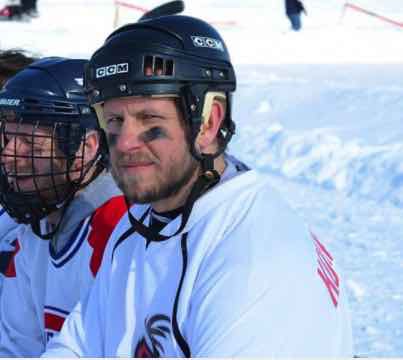
It was the first night of the playoffs for my beer league hockey team. After wrapping up work I headed straight to the rink excited to hang with my teammates and have some fun. It felt pretty much like any of the countless other nights I've spent playing hockey in my adult life - we had some laughs in the locker room at the expense of each other and headed out to the ice to take on Mott FK, a team made up of doctors and other medical professionals from the University of Michigan Children's Hospital. I was pretty fired up to be playing against them that night as my good friend, Dr. Jeff Zampi plays for Mott. When I saw Jeff on the ice during warm-ups I skated over to say hi and wish him luck, and I remember telling him "this is going to be fun tonight." Little did I know that I would be incredible grateful that he was there that night.
Everything seemed pretty normal as the game got underway, though I do remember feeling a little "off" throughout the contest. I seemed to be a bit unstable on my skates and felt a bit more winded than usual after each shift. That all changed early in the third period of the game. I recall picking up the puck near our blue line and making a rush up the ice (though with my skill level, I'm not sure "rush" is the right word), when I entered the other team's zone I tried to make an offensive move to get around a defender, but lost the puck. I felt incredibly exhausted after that play and skated over to our bench for a change. When I made my way down to my seat at the end of the bench I was really struggling to slow my breathing down and then started feeling an incredible tightness in my chest like someone was squeezing me. The pain was also radiating to my left shoulder and then I started to feel nauseated and light headed. I rested my head on the boards and then things went from bad to worse, the pain increased and things started getting all white around the edges - I could feel myself losing consciousness.
The next thing I knew there was a rush of sound and I woke up to the sound of Jeff's voice and one of my teammates encouraging me that I was ok, and going to be fine. I had no idea what happened, but I had suffered a sudden cardiac arrest. Apparently I slumped over and collapsed to the floor between the bench and the boards. Luckily one of my teammates next to me realized I was in distress and alerted everyone on the ice immediately. One of the first people over to the bench was my friend Jeff. Initially my teammates thought I was having a seizure as my body was shaking, but thanks to his training, Jeff quickly asked if I had a pulse. When they couldn't find one he jumped the boards and instantly began chest compressions. Someone else quickly called 911 and one of Jeff's teammates ran off to retrieve the AED. Thank goodness that our local rink has two easily accessible AEDs and that someone knew where to find them. Within about two minutes the AED was at ice level and Jeff and his teammates connected it to me and delivered the advised shock. The unit instructed them to continue chest compressions after the shock and they did so for another 4-5 minutes until my pulse returned and my breathing began to return to a normal level. Their quick and decisive actions, along with the access to the AED saved my life.
By the time the ambulance arrived I had already been stabilized and was completely responsive and able to move all of my extremities. The sustained hands-only CPR preserved my neurological capabilities and the function of my essential organs. Knowing that, I want to make sure that other people know how incredibly important it is to start compressions immediately if they ever see anyone in distress.
Once in the hospital it was determined that I had a 95% blockage of my Left Anterior Descending artery (aka "the widow maker") and they were able to repair the issue by inserting a stent. Thanks to the incredible work of the University of Michigan Cardiology team my prognosis is for a full recovery and a return to all of the activities I love.
My incident shows that SCA does not discriminate - it can happen to anyone, regardless of your activity levels or health. I'm in my 40s, my cholesterol levels are low, I have no sugar issues, I have no heart issues in my family, I'm in decent physical shape, and I exercise at least 5 days a week, yet it happened to me. Because of that, it's imperative that more people know how to recognize that someone is experiencing a cardiac event and that they have the willingness and confidence and intervene and start hands-only CPR immediately. Every second counts.
I'm so incredibly grateful for the actions of Jeff and the others that helped me that night. I'm so happy to have this second chance and to have more time to spend with my wife and my three kids. I just hope that my story helps others get the same chance.
